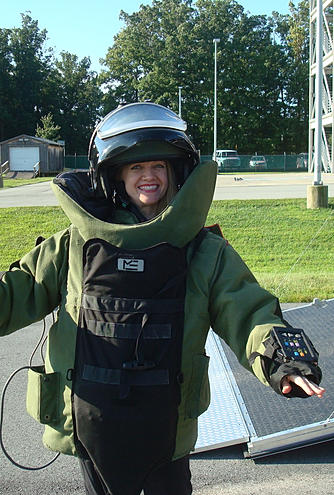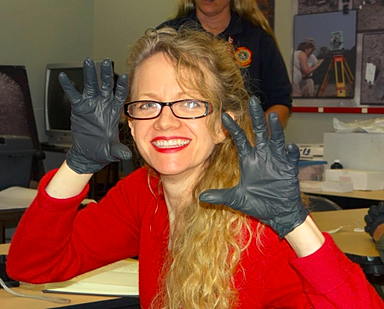Kristy -
I believe that when we've lived through a crisis, we can share the experience much more authentically. I try to start each novel with such an emotional experience because it helps the reader bond with the main character. Of course, a novel is littered with emotional experiences, but having one at the beginning helps build an immediate connection. My class was at a book club in Lake Forest, California. My hostess is an avid reader who has read several of my books and wanted me to share with her friends.
Fiona -
What kinds of experiences did you suggest would make good character connections with their readers?
Kristy -
The Highwayman Incident begins with Celia sitting alone at a wedding. It's a happy event, but she's not happy. I think we've all been in the situation before--where we're alone, isolated in our unhappiness in the midst of happy people.
The first chapter of Beyond the Hollow begins with what was truly the most frightening and inexplicable thing that has ever happened to me. (I'll share that in a moment.)
In my yet to be published Shell Charms I relate my experience of getting lost on the alcoholic floor of the Veteran's Hospital.
Stuck With You's first chapter is about getting stuck in an elevator. Everything can be what I call novel fodder.
Fiona -
As you're writing, I'm sure you go back and relive these experiences in order to capture the emotions. I'm interested in knowing how this experience unfolds for you, do you find those emotions difficult to experience again? Or perhaps it's more cathartic?
Kristy -
It's interesting, I've never really thought about it before, but reliving the experience also helps me, as well as the reader, bond with my character.
Fiona -
As you're writing, I'm sure you go back and relive these experiences in order to capture the emotions. I'm interested in knowing how this experience unfolds for you, do you find those emotions difficult to experience again? Or perhaps it's more cathartic?
Kristy -
It's interesting, I've never really thought about it before, but reliving the experience also helps me, as well as the reader, bond with my character.
Fiona -
So our topic tonight is the dark places we can explore in ourselves that will inform our writing - do you ever feel that by using personal stories in your writing that readers might extrapolate that out and infer that you've lived other scenes? Would this make you feel wary of sharing your personal life through your character?
Kristy -
I don't mind sharing my experiences. Of course, my characters have all sorts of experiences that I'll never have, which is good. Frankly, I'd find time travel terrifying. Someone asked me last night if I ever use my children in my writing, and the answer is absolutely not. Just because I'm okay with sharing myself with the world, that doesn't mean I can share my children. I try to respect privacy.
So our topic tonight is the dark places we can explore in ourselves that will inform our writing - do you ever feel that by using personal stories in your writing that readers might extrapolate that out and infer that you've lived other scenes? Would this make you feel wary of sharing your personal life through your character?
Kristy -
I don't mind sharing my experiences. Of course, my characters have all sorts of experiences that I'll never have, which is good. Frankly, I'd find time travel terrifying. Someone asked me last night if I ever use my children in my writing, and the answer is absolutely not. Just because I'm okay with sharing myself with the world, that doesn't mean I can share my children. I try to respect privacy.
Fiona -
You promised us a story. And if you wouldn't mind, perhaps an excerpt showing how that translated into your story?
Kristy -
Thanks for helping me drag out an old memory, truly one of the more frightening, inexplicable moments of my life. One of those am I crazy moments.
Th opening scene in my book is very loosely based on a night in the seventies. I was fourteen. My mother was dying of cancer. Her doctors had said there was nothing more to be done. In a last ditch effort, my parents traveled to Mexico for laetrile treatments. I’d been left at home with my twenty-four-year-old brother, who decided sometime around my bedtime, to go to Canada for the weekend. We lived in rural Washington on a large piece of property, as did our neighbors and friends. I felt isolated, but also safe.
I spent that night alone. Or did I? I woke around 3 a.m., the stereo in the room down the hall blaring, the volume turned up as high as it could go. The house was dark. At first, I thought my brother had returned. But no, he and his car were gone. The doors and windows were all locked. The stereo, an old fashioned turntable, was broken, and putting on a record required not just a push of a button, but slipping the record into place, turning on the stereo, and placing the needle on the spinning record. I suppose It’s possible I did all of this while sleepwalking and then returned to my bed only to be woken later…
Unlike Petra, I didn’t meet a demon (depending on how you categorize my brother… just kidding, love you, Dennis) and I don’t have a reasonable explanation for the blaring stereo.
Beyond the Hollow
Petra Baron couldn’t sleep.
The Santa Ana winds whistled through the canyon, spat dust and tossed the branches of trees. The wind seemed to be laughing at her. Not a hahaha aren’t we clever laughter, nor a teehee jokes on you giggle, but a cruel, moaning laughter that whistled through the stable, toyed at the window jambs and rattled the doors.
Petra fluffed her pillow, adjusted it so that she could see through the French doors without lifting her head. Out of the suburbs, away from streetlights, cars and the blue glare of neighboring TVs, the moon and stars carried more light. The late autumn moon, as big and as round as the pumpkins in the field, shone through the window and cast the room in a silver glow. Sleeping at the Jenson’s farm didn’t frighten her, even though she could see the golden eyes of the mountain lion pacing at the fringe of the property, looking for a hole in the fence, access to the animals safely tucked in the barn.
Since her return from England, she’d been training at the rifle range. She could shoot pistols as well as rifles. Determined to never again feel at any one’s mercy, she’d also enrolled in a martial arts program at the gym. Not that she’d try to Ninja kick a mountain lion, but should a horse scream or a sheep bleat she’d shoulder the shotgun and scare away the big cat.
Little cats, however, required another line of defense.
Petra shifted and tried to pull the quilt around her shoulders, but Magpie wouldn’t budge. Large, heavy, a glob of fur and drool, Magpie was a bed-hog. Magpie’s counterpart, Hector, preferred to sleep under the slipper chair. As was the case with so many couples, Magpie was emotionally needy and Hector was emotionally distant. Petra had tried locking the cats out of the bedroom. After all, they had a five thousand square foot hacienda at their disposal. Six unoccupied bedrooms, a den, a living room, a billiard room, they had free range. Petra only asked for one room, in fact, she’d have settle for one bed, but Magpie, as noisy as her name implied, refused to be shut out. And it didn’t really make sense to allow Magpie to share her space and not Hector. Who, by the way, snored. A malady typical of Persians.
Persians or mountain lions, which cat species did she prefer? Given a choice, she’d choose to be at home in her own bed, Frosty, her standard poodle asleep, sans snoring, at the foot of her bed, but the house-sitting gig at the Jensen’s paid well. She needed all the money she could lay her hands on if she wanted to attend Hudson River Academy, a small liberal arts college where Dr. Finch, the world’s leading professor of Elizabethan literature. Her dad would pony up for a state university, but he wasn’t interested in paying for ‘liberal farts.’ Petra began to mentally recalculate her finances and because money bored her she fell asleep listening to the wind’s laughter and Hector’s snore.
The wind whispers the prayers
Of all who live there
And carries them to heaven.
And the rain beats a time,
For those caught in rhyme,
For any who’ve lost life’s reason.
Petra bolted up and Magpie flew off the bed with a meow, her cry barely audible above the music. Pushing hair off her forehead, Petra tried to wake from the deafening dream. She swung her legs over the side of the bed, felt the cold tile floor beneath her feet. The music still played. Electric guitars. A keyboard. Drums. Seventies sound.
She oriented herself. Who’s here? Could the Jenson’s have returned? No, they had just posted pictures of the Vatican online less than two hours ago. Their son, Garth? He attended UCSB. A three-hour drive. It must be Garth, she thought. She looked out the window for a car in the drive. No car. He would have put it in the garage. He’d have the remote. The wind had quieted, the trees had stopped dancing. Steam from the horse’s warm breath rose from the stable. On the side of the hill, on the far side of the fence, gold eyes watched her window. The mountain lion, threatening, but incapable of manning sound systems.
She took a deep calming breath. It had to be Garth. She waited for the music to die. She'd learned the hard way years ago that you just couldn’t wait for the hero to ride in on his stallion.
If there are stories in your stream,
Don’t let them stop you mid- dream,
They’re just pebbles for the tossing.
They’re just mountains for the climbing.
She caught sight of herself in the mirror. Wild hair, smeared mascara, long arms and legs poking out of her Domo-Kun pajamas. She considered slipping into her clothes, but she didn’t want to fumble in the dark to find them, making noise, alerting the intruder. If there was an intruder. No, it had to be Garth, returning home, unexpectedly for the weekend. Why would anyone else break into a house and turn on a stereo? Who would do that?
Petra shuffled to the door, and plucked the shotgun off the wall, just in case it wasn’t Garth. She slipped a cartridge in the barrel and cocked the gun, just in case it was a Seventies-sounds-loving-lunatic.
She felt awkward shouldering the gun and opening the door. Hector squalled when she stepped on him. So much for not alerting the intruder, she thought as she righted herself and returned the rifle to ready position. Pushing through the door, Petra crept through the dark house until she found the source of the noise.
Your head is singing with the whispering,
So many voices, so many choices,
Which roads to take.
The stereo, an old-fashioned tape player, six feet tall, flashing lights and thrumming bass, boomed in the billiards room. Petra stared at it and then shouted above the music, “Garth?” When no one answered, she called, “Who’s there?”
Only the music replied. Magpie curled around her ankles. Her pajama topped slipped off her shoulder as she slowly circled the room, gun raised. Outside, beyond the fence, the mountain lion blinked at her.
Petra turned on the light just as the music ended. The tape sputtered at the end and clicked. She walked to the elaborate sound system, a relic of some distant time, and stared at it. Tiny flashing lights, a series of buttons and switches, it looked as complicated as an airplane cockpit. She didn’t even know how it worked. Maybe she’d walked in her sleep, but turning on the stereo?
The tape clicked out its questions, spinning round and round. Click. Click. Click. She found a switch, flipped it, and the system died. In the sudden quiet, she could her heart’s rapid beats and her accelerated breath.
“Not exactly a lullaby,” she said to Magpie, her voice nearly as loud as her thrumming blood.
“Garth?” she called out again. Maybe he was in the shower, or in the garage, or asleep.
She shouldered the gun, just in case. Every bathroom and bed empty. The garage dark, the cars vacant. She checked the windows and doors of each room. Securely locked. All of them. She flung open closet doors, used her shotgun to poke through the wardrobes. The alarm system in the front hall blinked its tiny red light. No one had broken in, at least, no one who didn’t know their way around the security system.
Th opening scene in my book is very loosely based on a night in the seventies. I was fourteen. My mother was dying of cancer. Her doctors had said there was nothing more to be done. In a last ditch effort, my parents traveled to Mexico for laetrile treatments. I’d been left at home with my twenty-four-year-old brother, who decided sometime around my bedtime, to go to Canada for the weekend. We lived in rural Washington on a large piece of property, as did our neighbors and friends. I felt isolated, but also safe.
I spent that night alone. Or did I? I woke around 3 a.m., the stereo in the room down the hall blaring, the volume turned up as high as it could go. The house was dark. At first, I thought my brother had returned. But no, he and his car were gone. The doors and windows were all locked. The stereo, an old fashioned turntable, was broken, and putting on a record required not just a push of a button, but slipping the record into place, turning on the stereo, and placing the needle on the spinning record. I suppose It’s possible I did all of this while sleepwalking and then returned to my bed only to be woken later…
Unlike Petra, I didn’t meet a demon (depending on how you categorize my brother… just kidding, love you, Dennis) and I don’t have a reasonable explanation for the blaring stereo.
Beyond the Hollow
Petra Baron couldn’t sleep.
The Santa Ana winds whistled through the canyon, spat dust and tossed the branches of trees. The wind seemed to be laughing at her. Not a hahaha aren’t we clever laughter, nor a teehee jokes on you giggle, but a cruel, moaning laughter that whistled through the stable, toyed at the window jambs and rattled the doors.
Petra fluffed her pillow, adjusted it so that she could see through the French doors without lifting her head. Out of the suburbs, away from streetlights, cars and the blue glare of neighboring TVs, the moon and stars carried more light. The late autumn moon, as big and as round as the pumpkins in the field, shone through the window and cast the room in a silver glow. Sleeping at the Jenson’s farm didn’t frighten her, even though she could see the golden eyes of the mountain lion pacing at the fringe of the property, looking for a hole in the fence, access to the animals safely tucked in the barn.
Since her return from England, she’d been training at the rifle range. She could shoot pistols as well as rifles. Determined to never again feel at any one’s mercy, she’d also enrolled in a martial arts program at the gym. Not that she’d try to Ninja kick a mountain lion, but should a horse scream or a sheep bleat she’d shoulder the shotgun and scare away the big cat.
Little cats, however, required another line of defense.
Petra shifted and tried to pull the quilt around her shoulders, but Magpie wouldn’t budge. Large, heavy, a glob of fur and drool, Magpie was a bed-hog. Magpie’s counterpart, Hector, preferred to sleep under the slipper chair. As was the case with so many couples, Magpie was emotionally needy and Hector was emotionally distant. Petra had tried locking the cats out of the bedroom. After all, they had a five thousand square foot hacienda at their disposal. Six unoccupied bedrooms, a den, a living room, a billiard room, they had free range. Petra only asked for one room, in fact, she’d have settle for one bed, but Magpie, as noisy as her name implied, refused to be shut out. And it didn’t really make sense to allow Magpie to share her space and not Hector. Who, by the way, snored. A malady typical of Persians.
Persians or mountain lions, which cat species did she prefer? Given a choice, she’d choose to be at home in her own bed, Frosty, her standard poodle asleep, sans snoring, at the foot of her bed, but the house-sitting gig at the Jensen’s paid well. She needed all the money she could lay her hands on if she wanted to attend Hudson River Academy, a small liberal arts college where Dr. Finch, the world’s leading professor of Elizabethan literature. Her dad would pony up for a state university, but he wasn’t interested in paying for ‘liberal farts.’ Petra began to mentally recalculate her finances and because money bored her she fell asleep listening to the wind’s laughter and Hector’s snore.
***
The wind whispers the prayers
Of all who live there
And carries them to heaven.
And the rain beats a time,
For those caught in rhyme,
For any who’ve lost life’s reason.
Petra bolted up and Magpie flew off the bed with a meow, her cry barely audible above the music. Pushing hair off her forehead, Petra tried to wake from the deafening dream. She swung her legs over the side of the bed, felt the cold tile floor beneath her feet. The music still played. Electric guitars. A keyboard. Drums. Seventies sound.
She oriented herself. Who’s here? Could the Jenson’s have returned? No, they had just posted pictures of the Vatican online less than two hours ago. Their son, Garth? He attended UCSB. A three-hour drive. It must be Garth, she thought. She looked out the window for a car in the drive. No car. He would have put it in the garage. He’d have the remote. The wind had quieted, the trees had stopped dancing. Steam from the horse’s warm breath rose from the stable. On the side of the hill, on the far side of the fence, gold eyes watched her window. The mountain lion, threatening, but incapable of manning sound systems.
She took a deep calming breath. It had to be Garth. She waited for the music to die. She'd learned the hard way years ago that you just couldn’t wait for the hero to ride in on his stallion.
If there are stories in your stream,
Don’t let them stop you mid- dream,
They’re just pebbles for the tossing.
They’re just mountains for the climbing.
She caught sight of herself in the mirror. Wild hair, smeared mascara, long arms and legs poking out of her Domo-Kun pajamas. She considered slipping into her clothes, but she didn’t want to fumble in the dark to find them, making noise, alerting the intruder. If there was an intruder. No, it had to be Garth, returning home, unexpectedly for the weekend. Why would anyone else break into a house and turn on a stereo? Who would do that?
Petra shuffled to the door, and plucked the shotgun off the wall, just in case it wasn’t Garth. She slipped a cartridge in the barrel and cocked the gun, just in case it was a Seventies-sounds-loving-lunatic.
She felt awkward shouldering the gun and opening the door. Hector squalled when she stepped on him. So much for not alerting the intruder, she thought as she righted herself and returned the rifle to ready position. Pushing through the door, Petra crept through the dark house until she found the source of the noise.
Your head is singing with the whispering,
So many voices, so many choices,
Which roads to take.
The stereo, an old-fashioned tape player, six feet tall, flashing lights and thrumming bass, boomed in the billiards room. Petra stared at it and then shouted above the music, “Garth?” When no one answered, she called, “Who’s there?”
Only the music replied. Magpie curled around her ankles. Her pajama topped slipped off her shoulder as she slowly circled the room, gun raised. Outside, beyond the fence, the mountain lion blinked at her.
Petra turned on the light just as the music ended. The tape sputtered at the end and clicked. She walked to the elaborate sound system, a relic of some distant time, and stared at it. Tiny flashing lights, a series of buttons and switches, it looked as complicated as an airplane cockpit. She didn’t even know how it worked. Maybe she’d walked in her sleep, but turning on the stereo?
The tape clicked out its questions, spinning round and round. Click. Click. Click. She found a switch, flipped it, and the system died. In the sudden quiet, she could her heart’s rapid beats and her accelerated breath.
“Not exactly a lullaby,” she said to Magpie, her voice nearly as loud as her thrumming blood.
“Garth?” she called out again. Maybe he was in the shower, or in the garage, or asleep.
She shouldered the gun, just in case. Every bathroom and bed empty. The garage dark, the cars vacant. She checked the windows and doors of each room. Securely locked. All of them. She flung open closet doors, used her shotgun to poke through the wardrobes. The alarm system in the front hall blinked its tiny red light. No one had broken in, at least, no one who didn’t know their way around the security system.
Petra sat down on the sofa in the living room and laid the gun across her lap. Magpie jumped up beside her, while Hector watched from underneath the grand piano. She absently stroked the cat and felt a smidge less panicked, telling herself she was alone. What should she do? Her cell didn’t get reception in the canyon, so she padded to the phone in the office and picked up the line.
Nothing. She looked at the receiver. The wind could have knocked down the line. Maybe she’d walked in her sleep and turned on the stereo. Since her return from Elizabethan England five months ago, she’d realized that life doesn’t always make sense. Sometimes random, inexplicable, even crazy things happened. And crazy things don’t have to make sense. Maybe the craziness makes sense to someone else, because everyone has a skewed sense of reason, and as mortals, mere humans, we can’t know everything. Sometimes, really truly, only heaven knows. Or hell.
Read more! HERE
Thank you so much for stopping by. And thank you for your support. When you buy my books, you make it possible for me to continue to bring you helpful articles and keep ThrillWriting free and accessible to all.



















